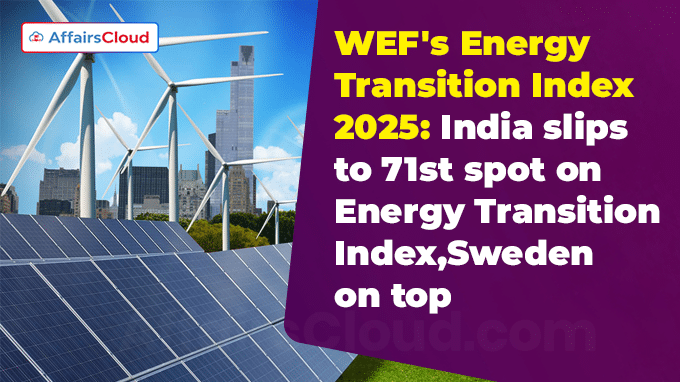 In June 2025, Geneva (Switzerland)- based World Economic Forum (WEF)released its annual report titled ‘Fostering Effective Energy Transition 2025’. As per the report, India has been ranked 71 with a score of 53.3 on the Global Energy Transition Index (ETI) 2025.
In June 2025, Geneva (Switzerland)- based World Economic Forum (WEF)released its annual report titled ‘Fostering Effective Energy Transition 2025’. As per the report, India has been ranked 71 with a score of 53.3 on the Global Energy Transition Index (ETI) 2025.
- Although this is a drop from 63rd rank in 2024 (a fall of 8 places), India made the biggest improvements among large economies, especially in providing better access to energy.
- Sweden maintained its top spot with a score of 77.5, followed by Finland in second place with 71.8, and Denmark closely behind in third with 71.6.
- Latvia and the United Arab Emirates (UAE) recorded some of the fastest score gains through clean energy adoption and targeted reforms. Democratic Republic of the Congo was ranked at the bottom with the lowest score of 42.4.
About Energy Transition Index (ETI):
The ETI is an annual benchmarking tool developed by the WEF in collaboration with Dublin, Ireland based Accenture.
i.It assesses the progress of countries towards achieving an equitable, secure, and sustainable energy future. The ETI evaluates countries based on their energy system performance and readiness for transition.
ii.The ETI framework comprises two main components:
- System Performance (60% weight): Assesses a country’s energy system across three dimensions(Equity, Security and Sustainability).
- Transition Readiness (40% weight) assesses how prepared a country is to shift towards sustainable energy. It focuses on two key areas:Core Enablers and Enabling Factors and five readiness factors(political commitment, finance and investment, innovation, infrastructure, and education and human capital).
iii.Countries are scored across 46 indicators, normalized on a scale from 0 to 100, where 100 signifies the highest global performance on each indicator. The ETI adopts a minimum-maximum method to normalize indicator scores.
Highlights of Energy Transition Index (ETI) 2025:
With 15 years of global analysis, the 2025 ETI offers a long-term view of energy system changes, showing that despite clean energy investment crossing USD 2 trillion in 2025, progress remained uneven across regions.
- The 2025 ETI showed that the global average score for energy transition performance went up by 1.1% compared to the 2024 score.
Top 5 Countries on ETI 2025 Ranking:
| Rank | Country | Score(Out of 100) |
|---|---|---|
| 1 | Sweden | 77.5 |
| 2 | Finland | 71.8 |
| 3 | Denmark | 71.6 |
| 4 | Norway | 71.5 |
| 5 | Switzerland | 71.0 |
| 71 | India | 53.3 |
Key Points:
i.Other countries in the top 10 of the ETI 2025 include Austria, Latvia, the Netherlands, Germany, and Portugal.
ii.China achieved its highest-ever rank at 12th place with a score of 67.5, driven by strong innovation, major clean energy investments, and new national emission reduction plans, placing 5th in transition readiness.
- China topped the “Emerging Asia” group, which includes India, with a 2.2% rise in its ETI score from 2024.
iii.The United States of America (USA) ranked 17th (score 66.8), leading in energy security and making progress in sustainability.
iv.Nigeria rose to 61st place due to improved financial investments and infrastructure.
v.Pakistan ranked 101st, reflecting difficulties in both energy system performance and transition readiness.
Diverse Regional Progress in Energy Transition:
i.Regional trends highlight the uneven pace of the energy transition across different areas. Emerging Europe and emerging Asia showed notable progress in transition readiness but followed different paths.
ii.Emerging Europe made the biggest strides in infrastructure and education, while emerging Asia’s improvements came mainly from increased investment and stronger regulations.
iii. At the same time, regions such as Sub-Saharan Africa advanced by boosting political commitment and financial support, underscoring the varied speed of readiness worldwide.
India’s ETI 2025 Performance:
India’s ETI score for 2025 is 53.3. This is made up of a score of 60.4 for system performance and 42.7 for transition readiness.
- India moved ahead in areas like energy efficiency and its ability to attract investments in the energy sector.
i.According to the report, India has improved energy access, strengthened clean energy policies, and reduced methane (CH₄) emissions over the past decade.
ii.While India is doing well in areas like energy security, access, and sustainability, its transition readiness is still weak.
Key Global Trends:
i.In 2025, although 77 out of 118 countries improved their ETI scores, only 28% made progress in all three key areas. 65% of countries saw an improvement in their ETI scores.
- This highlights that many countries still struggle to balance these aspects of their energy systems.
ii.The WTO has predicted that global merchandise trade will shrink by 0.2% in 2025, showing some slowdown in global trade activities.
iii.The report pointed out that even though clean energy investment reached USD 2 trillion in 2024, global emissions still rose to a record 37.8 billion tonnes.
- This was mainly because energy use increased by 2.2%, driven by the growing demand from Artificial intelligence (AI), data centres and electrification.
About World Economic Forum (WEF):
President and Chief Executive Officer (CEO)– Børge Brende (Norway)
Headquarters– Geneva, Switzerland
Established- 1971




